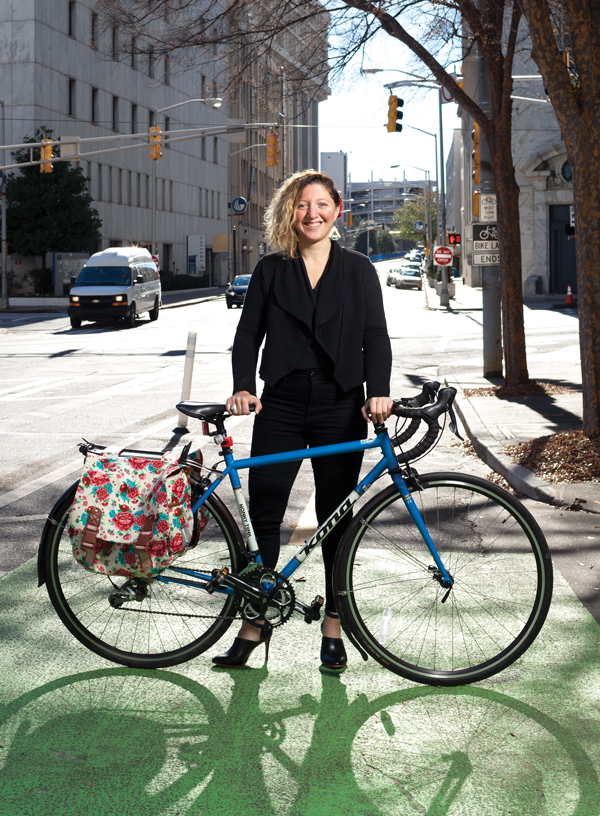
Becky Katz’s 2.6-mile commute from her house in Adair Park to her office in City Hall takes about 20 minutes. Her mode of transit—a $1,000 Kona Honky Tonk bicycle—is determined, by and large, by her occupation. As Atlanta’s first-ever “chief bicycle officer,” her job is a mix of public relations (spreading the gospel of bicycling in a city of agnostics), politics (cutting through red tape to boost ridership), and planning (expanding the city’s anemic network of bike lanes).
On a gray autumn morning, Katz begins to pedal north toward downtown. Atlanta looks far different from behind a set of handlebars than from behind a steering wheel. For one thing, it’s a lot more dangerous: A driver is encased in a ton or two of steel; Katz is protected by nothing but a Giro helmet. One day last February, a driver traveling 35 miles an hour rear-ended Katz near Castleberry Hill, totaling her bike and sending her to Grady Memorial Hospital for a broken shoulder socket and wrist. Danger can also come from below. Along the route to work, Katz swerves around a grate in the street whose bars run parallel to the curb—not perpendicular, as they should. If her tire got stuck between the bars, she’d likely go flying over the front of her bike.
Katz is one of 4,064 metro Atlantans who, according to census data, identify as daily bicycle commuters—this in a region with 2.6 million total commuters. Unsurprisingly, Atlanta lags behind cities like Portland, which has 10 times Atlanta’s percentage of bicycle commuters, or New York, home to Citi Bike, a bike share program with 6,000 cycles that plans to double in size.
For decades Atlanta approached bicycles the same way that other sprawling cities did—with little more than lip service. Rebecca Serna, the Atlanta Bicycle Coalition’s executive director, recalls 1995’s Atlanta Commuter On-Street Bike Plan, which called for a 354-mile network of bike lanes to be constructed over 15 years. As it happened, the city installed just 22 miles of bike lanes between 1995 and 2008. And some of that work, Serna says, amounted to little more than “half-mile bike lanes that led nowhere.”
But times are changing. Bicyclists, by necessity, are not shrinking violets. (Ever accidentally cut one off and seen their reaction?) And, just as they claim their space on the streets, they’ve also been demanding more attention from policymakers.
In 2008 city officials approved Connect Atlanta, a plan that calls for the creation, by 2030, of a 200-mile grid of bike lanes that extends from the city center to most of its borders. This would make it possible to pedal from Phipps Plaza to Greenbriar Mall on nothing but dedicated bike lanes. On state roads passing through the city, additional projects have materialized: A once-perilous corridor of Ponce de Leon Avenue is safer with bike lanes installed on the shoulder from Ponce City Market to Juniper Street. And, of course, there’s also the Atlanta BeltLine, more than three miles of which is complete. As of December, the city now has 84 miles of bike infrastructure (bike lanes, trails, etc.). By comparison, there are 1,584 miles of paved streets within the city.
Katz’s position owes its creation in part to the Arthur M. Blank Family Foundation, which in 2012 hosted a visit from Nicole Freedman, Boston’s “bike czar” at the time. John Bare, vice president of the Blank Foundation, says Freedman’s speech sparked a broader discussion between local nonprofit execs and bicycling advocates about how to turn Atlanta into a place where all people could access the city on two wheels. One obvious step? Creating Atlanta’s own bike czar. As Serna says, “The lack of a dedicated bike planner was a huge barrier.”
Just ask Brent Brewer, a West End resident who last winter joined his neighbors in requesting protected bike lanes on Lee Street from East Point to downtown Atlanta. He was told by city officials the project wouldn’t be included in Atlanta’s $250 million bond package—a once-in-a-generation pot of funding for, among other things, road and bridge projects. But don’t fear, city officials told him: Instead, they would collaborate with the Georgia Department of Transportation, which had planned to repave and mill the road anyway, making the project happen partially on the state’s dime. However, when GDOT got around to the work last summer, contractors repaved the road, minus the bike lanes. A chief bike officer, Brewer says, “would have made sure something this big wouldn’t get overlooked.”

Enter Katz, a Bronx native who moved to Atlanta in 2011 when she was 25. She learned the city on two wheels. Volunteer shifts with Park Pride led to a full-time job as a project manager, where she worked with communities seeking to improve their parks.
Katz’s $70,000 salary is funded by a five-year, $250,000 grant—supported by the Atlanta Falcons Youth Foundation, one of the Blank Foundation’s nonprofits—and the City of Atlanta. Mayor Kasim Reed, who greenlighted the gig in his goal to double the percentage of bike commuters in 2016, made Katz his point person in turning Atlanta into one of the top 10 cycling cities in the country. Her boss, planning and community development commissioner Tim Keane, considers Atlanta to be entering a crucial moment where residents are finally willing to think twice about the “presumption that 100 percent of trips will be by vehicle.”
The Reed administration wants Atlanta to earn the League of American Bicyclists’ top designation as a “Bicycle Friendly Community,” which is based on the quality of a city’s enforcement of laws, advocacy efforts, and bike infrastructure. To do so, Katz will solicit public input for an update to the Connect Atlanta plan. She’ll also ensure that projects that have already secured funding—like the plan to remove DeKalb Avenue’s “suicide lane” and install one for bikes—don’t fall by the wayside. Then there’s the anticipated launch this year of Atlanta Bike Share, a membership-based program that will provide 500 rentable bikes at more than 50 stations in neighborhoods like Buckhead, Midtown, and West End.
Just north of City Hall, Katz rides past Georgia State University toward Peachtree Center Avenue’s new two-way cycle track—one of the many streets where people will soon be able to ride rentable bikes. But a FedEx truck has double-parked in her path, forcing us to veer into oncoming traffic. Katz is nonplussed. “Change on our roads is a challenge,” she says. “A lot of people have driven it a thousand times every day for the past 30 years. There’s a learning period.”
If motorists can be reasoned with instead of reviled, she says, they might be more willing to see bike lanes as a plus—and not just something that slows down their travels. She points to Ponce as an example: After planners reduced the eastside avenue from six car lanes to four in December 2013, installing a dedicated turn lane in the middle and striped bike lanes on the shoulders, the number of vehicles traveling the road each day actually rose by 4,000. Yet the street became safer: Crashes dropped by 25 percent the next year. Duplicating that success will be easier said than done. A similar proposal for a 1.4-mile stretch of Peachtree Road was scrapped after more than 1,400 Buckhead residents and business leaders objected to the plan.
So there’s a long way to go. “Right now our connector streets—Metropolitan, Lee, Memorial, DeKalb, Boulevard, Peachtree Street—aren’t functioning for everybody,” Katz says. “They’re not safe. We need to create roads that are safe for all modes of transportation, whatever type you choose.”
The spread
1.7
Average miles of bike lanes installed per year in Atlanta between 1995 and 2008
200
Miles of bike lanes planned to be in place by 2030
25
Percent drop in car crashes in 2014 on stretch of Ponce de Leon after bike lanes were installed
This article originally appeared in our February 2016 issue under the headline “The Bike Czar.”














